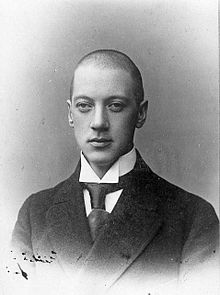Nikolai Stepanowitsch Gumilev
Nikolay Gumilyov ( Russian Николай Степанович Гумилёв , scientific. Transliteration Nikolaj Stepanovič Gumilev ; April * 3 . Jul / 15. April 1886 greg. In Kronstadt ; † 24. August 1921 in Berngardowka in Petrograd ) was a Russian poet of the Silver Age and one of the protagonists of the literary direction of acmeism .
Life
Nikolai Gumiljow was born in 1886 into the family of a naval doctor in Kronstadt. He attended - roughly at the same time as Anna Akhmatova - the high school in Tsarskoye Selo , the director of which was the well-known classical philologist and Euripides translator Innokenti Annensky . His first volume of poems, Weg der Konquistadoren ( Путь конквистадоров ) was published in 1905, before he graduated from school in 1906 . The later basic elements in Gumiljow's poetry were already visible in him: heroic adventures in exotic surroundings. The work caught the attention of the well-known symbolist Valeri Bryusov , with whom Gumilev had corresponded ever since.
In 1907 Gumiljow traveled to Paris , where he studied French literature at the Sorbonne , edited the magazine Sirius and in 1908 his second volume of poems, Romantic Flowers ( Романтические цветы ).
Gumiljow's first trip to Africa , in 1908 to Egypt , inspired the young poet for the continent; African motifs found their way into Russian poetry through Gumiljow . Further trips to Abyssinia in the winter of 1909/1910 and 1910/1911 resulted in the cycle of poems Abyssinian songs ( Абиссинские песни ), published in the Fremder Himmel collection ( Чужое небо , 1912).
After Gumiljow continued his studies at the historical and philosophical faculty of St. Petersburg University in the fall of 1909 , he published the collection of poems Perlen ( Жемчуга ) in 1910 , for which Bryusov wrote the foreword. He became a well-known figure in the Petersburg literary scene and in the same year married Anna Akhmatova. Together with Mandelstam , Achmatowa and others, he founded the poets ' guild ( Цех поэтов ) in 1911, which became the nucleus of acmeism through the manifesto The Legacy of Symbolism and Acmeism ( Наследие символизма и акмеизм ) . He was the chief editor of the academic journal Apollon .
A research trip to Africa on behalf of the Academy of Sciences in 1913 reinforced Gumiljow's experience as a researcher, hunter and adventurer and his passion for Abyssinia.
With the beginning of the First World War , Gumilev volunteered for the front and reported regularly in the magazine Börsennachrichten with his notes from a cavalry soldier ( Записки кавалериста ). During the war, two collections of poetry, in 1916 published The quiver ( Колчан ) and 1918 pyre ( Костер ).
At the beginning of the revolution, Gumilev stayed with his unit in Paris and London - on his return to Petersburg (then Petrograd) he immediately returned to literary life and became a member of the editorial collective of the publishing house Weltliteratur ( Всемирная литература ). During his time at the publishing house, he translated the Gilgamesh epic and works by Heine and Coleridge into Russian. He also taught poetry and translation theory and led courses for young poets.
In 1921 Gumilev was elected chairman of the Petrograd Poets Association. After his last book The Column of Fire ( Огненный столп ) was published, he was shot dead by Bolsheviks in August of the same year as an officer in the Imperial Army on charges of participating in a counterrevolutionary conspiracy in Berngadowka near Petrograd .
Gumilev's works were not allowed to be published for a long time after his death; except in samizdat and antiquarian editions, they were not available. Only under Gorbachev in 1986 did his rehabilitation take place.
Works
Dramas
- Don Juan in Egypt , one-act drama in verse, 1912
- Akton , verse drama in one act, 1913
- The Child of Allah , verse drama in one act, 1917
- Gondla , verse drama in four acts, 1917
literature
- Wadim Krejd: Николай Гумилев в воспоминаниях современников . Paris 1989 (German translation of the title: Nikolai Gumiljow in the memories of his contemporaries ).
- Vladimir Polushin: Николай Гумилев. Жизнь расстрелянного поэта . Молодая гвардия, Moscow 2006 (German translation of the title: Nikolai Gumiljow. The life of a shot poet ).
Web links
- Literature by and about Nikolai Stepanowitsch Gumiljow in the catalog of the German National Library
- Extensive Gumiljow page with photos and poems (Russian, German poetry translations)
- Portrait photos
Individual evidence
- ^ Lev Gumiljow: From the Rus to Russia. Ethnic History of Russians well told . Publishing house Monsenstein and Vannerdat, Münster 2005. ISBN 3-86582-214-2 . P. 336.
- ↑ Article Nikolay Stepanovich Gumilyov in the Encyclopædia Britannica .
| personal data | |
|---|---|
| SURNAME | Gumilev, Nikolai Stepanowitsch |
| ALTERNATIVE NAMES | Гумилёв, Николай Степанович (Russian); Gumilëv, Nikolaj Stepanovič (scientific transliteration); Gumilev, Nikolai |
| BRIEF DESCRIPTION | Russian poet of the Silver Age and one of the protagonists of the literary direction of acmeism |
| DATE OF BIRTH | April 15, 1886 |
| PLACE OF BIRTH | Kronstadt |
| DATE OF DEATH | August 24, 1921 |
| Place of death | Berngardowka near Petrograd |
